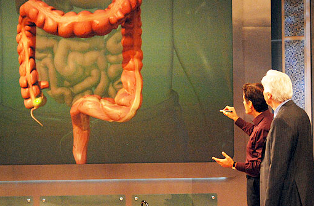
September 5th, 2010 by JenniferKearneyStrouse in Better Health Network, News, Research
Tags: ACP Internist, Colon Cancer Screening Test, Colorectal Health, Epidemiology, Family Medicine, Gastroenterology, General Medicine, Internal Medicine, LA Times, Los Angeles Times, Physician Awareness, Primary Care, Rectal Bleeding, Rectal Cancer Rates, SEER Registry, Symptom Alerts For Doctors, Younger People
No Comments »

Rates of rectal cancer in those younger than 40 have been increasing, the LA Times reported recently.
Researchers studied data from the Surveillance, Epidemiology and End Results (SEER) Registry and looked at the change in rectal and colon cancer incidence in those under 40 from 1973 to 2005. Overall rates were low, but while colon cancer incidence remained constant, rectal cancer incidence increased by an average of 3.8 percent annually, the authors reported in the journal Cancer.
The authors didn’t advocate routine screening in those under 40, but did recommend that physicians be more alert to the possibility of rectal cancer in those presenting with symptoms such as rectal bleeding, according to the Times. (LA Times)

*This blog post was originally published at ACP Internist*
September 4th, 2010 by Dr. Val Jones in Better Health Network, Health Tips, News
Tags: California, Canada, Infectious Disease, News, Pertussis, Public Health, Public Health Agency Of Canada, Vaccines, Whooping Cough
No Comments »
 The Public Health Agency of Canada has issued a “travel health notice” to its citizens who plan to travel to California. Childhood vaccination against whooping cough (pertussis) has dropped low enough to result in a 7-fold increase in the number of infections over the past year alone.
The Public Health Agency of Canada has issued a “travel health notice” to its citizens who plan to travel to California. Childhood vaccination against whooping cough (pertussis) has dropped low enough to result in a 7-fold increase in the number of infections over the past year alone.
An increasing number of parents are opting out of vaccines, a trend that could threaten to reverse the preventive health gains we’ve made against certain infectious diseases this past century. How scary is that?
Incidentally, whooping cough can be lethal — killing a small percentage of kids who suffocate from the damage it does to the respiratory tract. For more information about whooping cough, I recommend the Mayo Clinic’s consumer health website.
To all the moms and dads out there, please vaccinate your kids. The benefits far outweigh any potential harms. And to you Canadians, make sure you’re vaccinated before you go to California.
September 3rd, 2010 by Felasfa Wodajo, M.D. in Better Health Network, Health Tips, News, Opinion, True Stories
Tags: 24-Hour Security Monitoring Service, 911, Accelerometer, Android Smartphones, Automatic GPS localization, Emergency Medicine, Fall Detection, Florida State University, General Medicine, iPhone App, iTunes, Medical Alert Bracelet, Medical Apps, OnCall Defender Medical Alert, OnCall Defender Panic Alert, Wireless EMT Alert Service
2 Comments »

 OnCall Defender Medical Alert (available via iTunes) is an iPhone app that features 3G connection to a 24-hour security monitoring service. Via a subscription service, you can use your iPhone to send an emergency notification to the service after which local law enforcement or EMT services, depending on the type of alarm, will be dispatched.
OnCall Defender Medical Alert (available via iTunes) is an iPhone app that features 3G connection to a 24-hour security monitoring service. Via a subscription service, you can use your iPhone to send an emergency notification to the service after which local law enforcement or EMT services, depending on the type of alarm, will be dispatched.
The advantage over using 911 is that the monitoring service automatically receives GPS localization of your whereabouts and that you can cancel the emergency call within 15 seconds. The service costs $16.99 a month or $9.99 with a one-year subscription. Read more »
*This blog post was originally published at iMedicalApps*
September 3rd, 2010 by Jon LaPook, M.D. in Better Health Network, Health Tips, News, Research, True Stories
Tags: Adenomatous Polyp, Benign Polyps, Colon Cancer, Colon Cancer Screening Test, Colonoscopy, Colorectal Health, Dr. Mehmet Oz, Family Medical History, Family Medicine, Gastroenterology, Gastrointestional Medicine, General Medicine, Internal Medicine, Katie Couric Effect, Lack Of Exercise, Obesity, Pre-Cancerous Colon Polyp, Preventive Medicine, Preventive Screening, Primary Care, Processed Meats, Public Awareness, Red Meat, Smokers, smoking, Too Much Alcohol
No Comments »
 Dr. Mehmet Oz just might be the last person on earth people would expect to get a colon polyp. He’s physically fit (he left me in the dust the last time we ran together), he eats a healthy diet, he doesn’t smoke, and he has no family history of colorectal cancer or colon polyps.
Dr. Mehmet Oz just might be the last person on earth people would expect to get a colon polyp. He’s physically fit (he left me in the dust the last time we ran together), he eats a healthy diet, he doesn’t smoke, and he has no family history of colorectal cancer or colon polyps.
But several weeks ago, when Mehmet had his first screening colonoscopy at age 50, I removed a small adenomatous polyp that had the potential to turn into cancer over time. Statistically, most small polyps like his don’t become cancer. But almost all colon cancers begin as benign polyps that gradually become malignant over about 10 to 15 years.
Since there’s no way of knowing which polyps will turn bad, we take them all out. The good news is there’s plenty of opportunity to prevent cancer by removing these polyps while they are still benign. But only about 63 percent of Americans between ages 50 and 75 get screened for colorectal cancer. Read more »
September 3rd, 2010 by GarySchwitzer in Better Health Network, Health Policy, Health Tips, News, Opinion, Quackery Exposed, Research
Tags: Association Vs. Causation, Cause-And-Effect, Evidence-Based Health Media, Fail To Educate Readers, Health Benefits of Coffee Consumption, Health Journalism, Inaccurate Health Reporting, Java, Media Inaccuracy, Misleading Patients, Observational Studies, Prevention Magazine, Science Journalism, Science-Based Evidence, Statistical Association, Super Foods
No Comments »

The September issue of Prevention magazine inaccurately headlines the story “4 Ways Coffee Cures.” There’s no solid proof that coffee cures anything — unless some of you cure bacon with java, which I don’t want to know about.
What the story (below) did was to try to present a cute little graphic summary of observational studies that show a statistical association between increasing coffee consumption and fewer early deaths, fewer deaths from heart attack, fewer cases of dementia, and fewer cases of type 2 diabetes.
But such observational studies (they actually never cite the source — I’m just giving them the benefit of the doubt that they’re citing observational studies) CAN’T establish cause and effect, therefore it’s inaccurate for the story to use terms like “cure,” “protective,” and “lowers (or reduces or slashes) your risk.” Besides being inaccurate, such stories fail to educate readers. They mislead.
We ask the editors of Prevention to read and understand our guide “Does the Language Fit the Evidence? Association versus Causation.”

*This blog post was originally published at Gary Schwitzer's HealthNewsReview Blog*






 OnCall Defender Medical Alert (available via
OnCall Defender Medical Alert (available via  Dr. Mehmet Oz just might be the last person on earth people would expect to get a colon polyp. He’s physically fit (he left me in the dust the last time we ran together), he eats a healthy diet, he doesn’t smoke, and he has no family history of colorectal cancer or colon polyps.
Dr. Mehmet Oz just might be the last person on earth people would expect to get a colon polyp. He’s physically fit (he left me in the dust the last time we ran together), he eats a healthy diet, he doesn’t smoke, and he has no family history of colorectal cancer or colon polyps.









